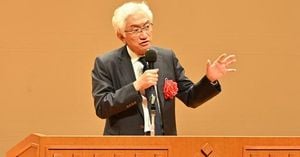U.S. Rep. Jasmine Crockett (D-Texas) is facing backlash for her inflammatory comments directed at Texas Governor Greg Abbott, whom she mockingly referred to as "Governor Hot Wheels" during a Human Rights Campaign event in Los Angeles on March 22, 2025. The remarks have sparked discussions surrounding censure within the political arena, as they draw attention to the rising tensions between Democrats and Republicans in Congress over conduct deemed unbecoming of members.
Crockett's comments were made while addressing supporters at the Human Rights Campaign dinner, where she said, "Y’all know we got Governor Hot Wheels down there. Come on now! And the only thing hot about him is that he is a hot ass mess, honey." These remarks did not sit well with many lawmakers, especially among the GOP, who responded with outrage, calling her insults discriminatory and inappropriate.
In response to the incident, Rep. Randy Weber (R-Texas) announced plans to introduce a resolution that would censure Crockett. Weber stated that her comments were "unbecoming of a Member of Congress," which reflects a worsening trend regarding personal attacks among lawmakers. Until recently, censure was a rare punishment in Congress, with only five instances since 2021, including one directed at former Rep. Paul Gosar (R-Ariz.). Since Republicans regained control of the House in 2023, four Democrats have been censured, indicating a new norm for disciplining members.
Crockett's latest remarks represent not just a single incident but rather a series of controversial statements that have put her under public scrutiny, including past comments about fellow Representative Marjorie Taylor Greene (R-Ga.). In a previous incident during an Oversight Committee hearing, Crockett described Greene as having a "bad built, bleach blonde, butch body." This history of aggressive rhetoric may play a role in framing the censure resolution against her.
Critics from across the aisle have been vocal about their disapproval. Sen. John Cornyn (R-Texas) sharply criticized Crockett, asserting her comments were "disgraceful," while the National Republican Congressional Committee stated that she epitomizes the media perception of today’s Democratic Party as divisive and out of touch. Conservative activist Charlie Kirk called her remarks "trash," emphasizing that they highlight a broader issue of disrespectfulness in political discourse.
In the aftermath, Crockett defended herself, claiming her intent was not to mock the governor's disability but rather to criticize his policies, particularly those regarding immigration. She took to social media, asserting, "I was thinking about the planes, trains, and automobiles he used to transfer migrants into communities led by Black mayors, deliberately stoking tension and fear among the most vulnerable. At no point did I mention or allude to his condition." Crockett's attempt to shift focus back to policy rather than personal characterizations could reflect a strategy to disengage from the backlash.
Governor Abbott, who has used a wheelchair since a devastating tree accident that left him paralyzed while jogging at the age of 26 in 1984, has been the subject of ridicule from various quarters in the past. The comments by Crockett come amid a broader discussion on the ethics of using personal disabilities in political attacks, a subject that stirs deep sentiments and contentious debate across party lines.
This incident serves as a stark reminder that the rhetoric in political debates can swiftly escalate from policy disagreements into personal attacks, often damaging relationships that are already fragile within the legislative arena. As legislators continue to use social media to amplify their voices, such exchanges may only rotate the cycle of harshness that defines many political interactions.
Amidst all of this, critiques continue to flow. Attorney General Ken Paxton labeled Crockett’s quips "despicable," while Republican leaders emphasize the need for civility and respect among public servants. Such beliefs have rallied Republicans, uniting them against what they perceive as unwarranted attacks on one of their party leaders.
As the political fallout unfolds, the House of Representatives will likely be facing a challenging internal environment where member conduct is increasingly under scrutiny. The censure resolution against Crockett will serve to illustrate the Democrats' and Republicans' ongoing struggle to maintain decorum while addressing contentious issues, sometimes resorting to personal disparagement instead of constructive dialogue.
Beyond the immediate implications for Rep. Crockett, these events highlight the question of how Congress can foster a civil discourse amidst growing partisan divides. As representatives navigate the complex layers of governance, they face the dual challenge of adhering to the values of their constituents while also participating in a system that often prioritizes sensationalism over substance.
The repercussions of this incident may reverberate throughout Congress as it ignites further discussions about the standards expected of elected officials. The stakes are high, and as members seek to rebuke one another or align on policy issues, they must remain vigilant against cursorial engagement that erodes trust and threatens productive governance.








